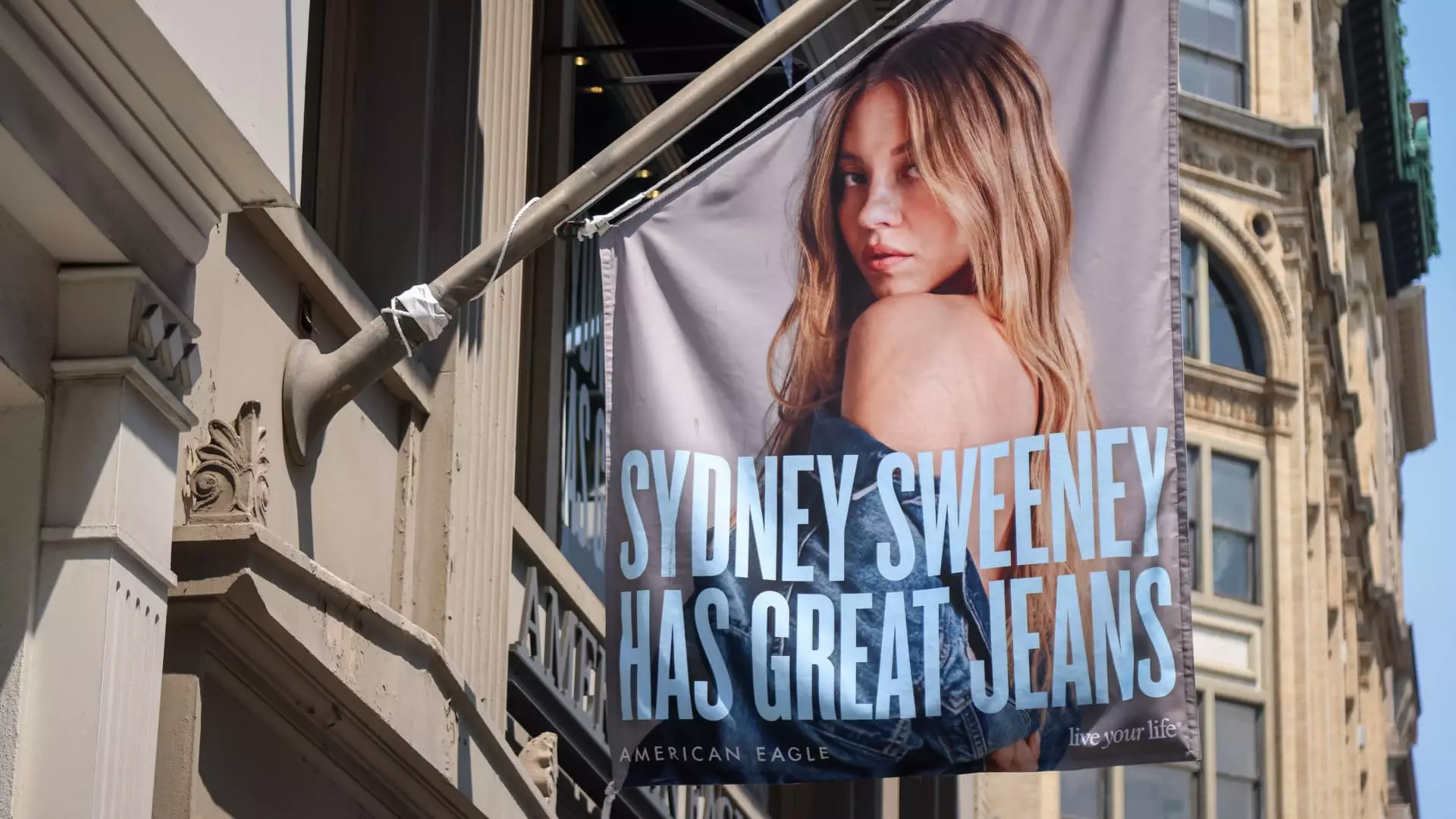In today’s hyper-polarized society, brands find themselves caught between two opposing forces: the desire to capitalize on cultural trends and the risk of alienating their core audiences. American Eagle’s recent marketing stunt featuring Sydney Sweeney exemplifies this precarious balancing act. The company’s gamble—a campaign that leaned heavily into youthful, edgy imagery—was intended to boost flagging sales and revive interest among a demographic increasingly disillusioned with traditional advertising. However, what was initially a calculated risk soon became a battleground of cultural interpretations, exposing the deep divisions that define contemporary consumer sentiment.
In an era where social media acts as both a megaphone and a magnifying glass, even a benign marketing slogan can spiral into controversy. American Eagle’s choice of the tagline “Sydney Sweeney has great jeans” was straightforward—at least on the surface. Yet, the slogan was quickly weaponized by critics who suggested it was a double entendre, detracting from its intended focus on fashion and shifting attention toward perceived superficiality or even subtle racial and aesthetic judgments. Such criticisms reveal how easily a brand can become ensnared in ideological crossfire, especially when celebrity endorsement intersects with political identity.
The company’s silence amid the swirling accusations only compounded the issue. Responding with a muted statement that the campaign was simply about the jeans offers little in terms of resolution or reassurance. Instead, it underscores a broader truth: in a divided culture, ignoring the controversy often signals tacit approval or helplessness. American Eagle’s reluctance to engage directly with critics demonstrates the difficulty brands face in navigating these treacherous ideological waters. In a context where consumers are increasingly vocal about their values, silence can be interpreted as marginalized acceptance of norms that may be out of sync with contemporary expectations.
The Power and Peril of Celebrity Endorsements in a Fractured Society
The involvement of Sydney Sweeney—an actress with considerable influence on younger audiences—was intended to lend the campaign authenticity and appeal. Yet, her political identification as a registered Republican added layers of complexity. For some consumers, her endorsement was a badge of authenticity; for others, it became a symbol of cultural recalcitrance. The president himself chimed in, voicing approval on his social media platform and giving American Eagle’s campaign a surprising political boost. This highlights an uncomfortable truth: celebrity endorsements are no longer neutral tools; they are inherently political and polarizing.
While some may argue that this is merely the evolving nature of marketing—where personal brand and political leanings inevitably intersect—the consequence is that brands must now carefully consider the broader societal implications of who they associate their products with. American Eagle’s gamble appeared to be to align with a populist, perhaps even patriotic, sentiment through Sweeney’s inclusion and Trump’s endorsement. But such an approach is fraught with risk, especially when companies are trying to appeal to a demographic that increasingly values authenticity and values over superficial brand bravado.
Additionally, this scenario illuminates the dangerous allure of meme stock mentality—spikes driven more by social media trends and manufactured hype than genuine consumer interest. While American Eagle’s shares surged temporarily, the uptick was fragile and short-lived, particularly because the underlying issues—sluggish sales, poor macroeconomic conditions, and misaligned marketing—remained unresolved. It’s a stark reminder that superficial attention, driven by celebrity endorsements or political shout-outs, does not translate into sustainable growth.
Consumer Trust and the Battle Over Cultural Narrative
The core challenge for brands like American Eagle isn’t just about sales but about maintaining relevance in a world where cultural narratives are fiercely contested. The company’s attempt to jumpstart sales using provocative imagery and celebrity influence was an overture into the ongoing battle over what constitutes appropriate marketing. Those criticizing the campaign for being overly sexualized or out of touch aren’t simply moral purists—they reflect a broader shift in consumer expectations. Customers increasingly seek authenticity, inclusivity, and respect for diverse identities, traits that traditional, hyper-sexualized advertising often fails to deliver.
American Eagle’s defiant insistence that the slogan was solely about jeans dismisses a fundamental change in societal norms. Consumers are now more scrutinizing than ever, demanding transparency and accountability. When corporations dismiss criticism as mere “culture war” noise, they risk alienating a portion of their audience—the very consumers who prize integrity and genuine representation. In this landscape, superficial attempts to ride populist sentiments without substantive engagement inevitably backfire.
Seeing how American Eagle’s campaign was suddenly reinvigorated by a political endorsement illustrates just how intertwined consumer trust and cultural alignment have become. Brands that underestimate the importance of integrating contemporary values into their messaging risk long-term damage. Market success today is less about clever slogans or celebrity sightings; it depends heavily on authenticity—an attribute that a superficial campaign, no matter how provocative, cannot sustain. In this fiercely divided environment, companies must navigate the difficult waters of identity, values, and cultural perception with more sensitivity and awareness than ever before.


Leave a Reply